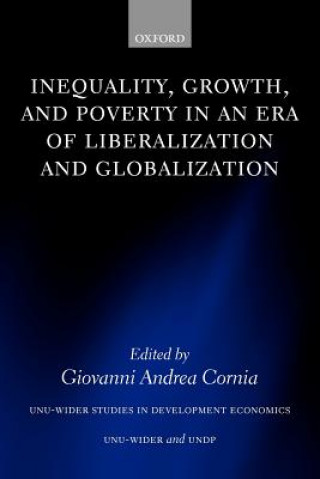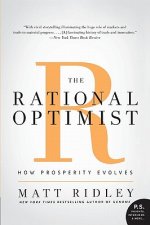
Code: 04531661
Inequality, Growth, and Poverty in an Era of Liberalization and Globalization
by Giovanni Andrea Cornia
Within-country income inequality has risen since the early 1980s in most of the OECD, all transitional, and many developing countries. More recently, inequality has risen also in India and nations affected by the Asian crisis. Alt ... more
- Language:
 English
English - Binding: Paperback
- Number of pages: 464
Publisher: Oxford University Press, 2005
- More about this

You might also like
-

Laboratory Life
50.01 € -

Liberal Lion
62.38 € -

Transformative Learning and Online Education
208.91 € -

Connecticut Lore: Strange, Off-Kilter, and Full of Surprises
14.28 € -21 % -

Applique for Little Ones
25.35 € -4 % -

Hope's Boy
9.05 € -5 % -

Raphael's Astronomical Ephemeris of the Planets' Places
6.03 € -18 %
Give this book as a present today
- Order book and choose Gift Order.
- We will send you book gift voucher at once. You can give it out to anyone.
- Book will be send to donee, nothing more to care about.
More about Inequality, Growth, and Poverty in an Era of Liberalization and Globalization
You get 453 loyalty points
 Book synopsis
Book synopsis
Within-country income inequality has risen since the early 1980s in most of the OECD, all transitional, and many developing countries. More recently, inequality has risen also in India and nations affected by the Asian crisis. Altogether, over the last twenty years, inequality worsened in 70 per cent of the 73 countries analysed in this volume, with the Gini index rising by over five points in half of them. In several cases, the Gini index follows a U-shaped pattern, with the turn-around point located between the late 1970s and early 1990s. Where the shift towards liberalization and globalization was concluded, the right arm of the U stabilized at the 'steady state level of inequality' typical of the new policy regime, as observed in the UK after 1990. Mainstream theory focusing on rises in wage differentials by skill caused by either North-South trade, migration, or technological change poorly explains the recent rise in income inequality. Likewise, while the traditional causes of income polarization-high land concentration, unequal access to education, the urban bias, the 'curse of natural resources'-still account for much of cross-country variation in income inequality, they cannot explain its recent rise. This volume suggests that the recent rise in income inequality was caused to a considerable extent by a policy-driven worsening in factorial income distribution, wage spread and spatial inequality. In this regard, the volume discusses the distributive impact of reforms in trade and financial liberalization, taxation, public expenditure, safety nets, and labour markets. The volume thus represents one of the first attempts to analyse systematically the relation between policy changes inspired by liberalization and globalization and income inequality. It suggests that capital account liberalization appears to have had-on average-the strongest disequalizing effect, followed by domestic financial liberalization, labour market deregulation, and tax reform. Trade liberalization had unclear effects, while public expenditure reform often had positive effects.
 Book details
Book details
Book category Books in English Society & social sciences Society & culture: general Social issues & processes
180.13 €
- Full title: Inequality, Growth, and Poverty in an Era of Liberalization and Globalization
- Author: Giovanni Andrea Cornia
- Language:
 English
English - Binding: Paperback
- Number of pages: 464
- EAN: 9780199284108
- ISBN: 0199284105
- ID: 04531661
- Publisher: Oxford University Press
- Weight: 716 g
- Dimensions: 234 × 158 × 26 mm
- Date of publishing: 16. June 2005
Trending among others
-

Shock Doctrine
14.78 € -22 % -

Scum Manifesto
8.44 € -15 % -

Secret Lives of Introverts
13.07 € -27 % -

A Room of One's Own
7.94 € -6 % -

Alcoholics Anonymous Big Book
22.53 € -1 % -

Free from Lies
19.21 € -19 % -

Violence
12.77 € -18 % -

Testo Junkie
22.83 € -14 % -

4 Steps to the Future
12.97 € -19 % -

Alcoholics Anonymous Big Book
22.33 € -

Body Never Lies
15.69 € -14 % -

The Second Sex
7.03 € -25 % -

The Lucifer Effect
18.81 € -13 % -

The Feminine Mystique
10.05 € -24 % -

Regarding the Pain of Others
12.17 € -22 % -

Superforecasting
10.86 € -23 % -

The Divide
11.87 € -16 % -

Out Of The Shadows:understanding Sexual Addiction
15.89 € -16 % -

White Tears Brown Scars
10.15 € -23 % -

Psychopath Free
20.22 € -3 % -

Courage To Heal Workbook
22.83 € -17 % -

Prize
18.71 € -21 % -

Manifestly Haraway
18.41 € -11 % -

I Choose To Live
11.26 € -28 % -

Men Explain Things to Me
10.86 € -31 % -

Food Of The Gods
15.29 € -27 % -

Toxic Parents
14.28 € -22 % -

The Beauty Myth
6.03 € -28 % -

Pedagogy of the Oppressed
10.05 € -24 % -

Rational Recovery
15.19 € -24 % -

No Logo
11.87 € -19 % -

Sorry I'm Late, I Didn't Want to Come
10.96 € -23 % -

Soft Power
14.28 € -28 % -

Feminism, Interrupted
13.58 € -4 % -

Blitzed
11.36 € -20 % -

Reclaiming Conversation
16.39 € -18 % -

From Rage to Courage
18.21 € -13 % -

Political Correctness Gone Mad?
8.64 € -29 % -

Vagina
10.76 € -16 % -

Rational Optimist
15.79 € -24 % -

Great Leveler
17.40 € -12 % -

Story of My Life
6.03 € -

Stuart
13.37 € -14 % -

Feminism is for Everybody
20.92 € -14 % -

Conflict Is Not Abuse
17.50 € -16 % -

Presence
14.48 € -24 % -

Zeros and Ones
10.96 € -16 % -

BEYOND WORDS
19.51 € -15 % -

Problem that Has No Name
2.41 € -4 %
Collection points Bratislava a 2642 dalších
Copyright ©2008-24 najlacnejsie-knihy.sk All rights reservedPrivacyCookies



 15549 collection points
15549 collection points Delivery 2.99 €
Delivery 2.99 € 02/210 210 99 (8-15.30h)
02/210 210 99 (8-15.30h)